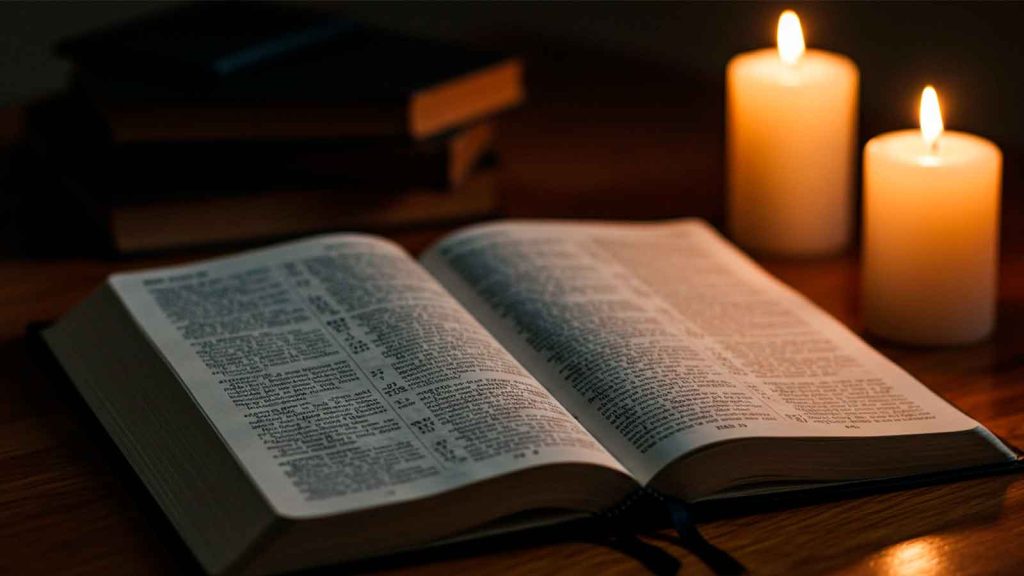Psalm 79 is one of the most intense psalms in the Book of Psalms, delivering a message of lament over destruction and a cry for divine intervention. From its opening verses it draws attention to the pain of Israel and its plea for redemption. This article explores Psalm 79 in detail, analyzing its meanings, lessons, and applications for today’s readers.
Psalm 79 in Full
¹ O God, the nations have come into Your inheritance; they have defiled Your holy temple and reduced Jerusalem to heaps of rubble.
² They have given the dead bodies of Your servants as food for the birds of the sky, the flesh of Your faithful ones for the beasts of the earth.
³ They have poured out their blood like water all around Jerusalem, and there was no one to bury them.
⁴ We have become a reproach to our neighbors, a mockery and scorn to those around us.
⁵ How long, LORD? Will You be angry forever? Will Your jealousy burn like fire?
⁶ Pour out Your wrath on the nations that do not acknowledge You, on the kingdoms that do not call on Your name.
⁷ For they have devoured Jacob and laid waste his dwellings.
⁸ Do not remember our former iniquities; let Your mercies come quickly to meet us, for we are brought very low.
⁹ Help us, O God of our salvation, for the glory of Your name; deliver us and forgive our sins for the sake of Your name.
¹⁰ Why should the nations say, “Where is their God?” Let the avenging of the blood of Your servants that was shed be known among the nations in our sight.
¹¹ May the groans of the prisoners come before You; according to the greatness of Your arm preserve those condemned to die.
¹² Repay our neighbors sevenfold into their bosom the reproach with which they have reproached You, Lord.
¹³ Then we, Your people and the sheep of Your pasture, will give You thanks forever; from generation to generation we will recount Your praise.

Psalm 79 Explained – Verse by Verse
Psalm 79:1
“O God, the nations have come into Your inheritance; they have defiled Your holy temple and reduced Jerusalem to heaps of rubble.”
The psalmist opens by describing the enemy invasion that devastated Jerusalem and profaned the sacred temple—the very center of God’s presence among His people.
Psalm 79:2
“They have given the dead bodies of Your servants as food for the birds of the sky, the flesh of Your faithful ones for the beasts of the earth.”
He laments that the bodies of the dead were left to wild birds and animals—considered a profound dishonor.
Psalm 79:3
“They have poured out their blood like water all around Jerusalem, and there was no one to bury them.”
The tragedy was so great that blood flowed like water and no one remained to give the dead a proper burial.
Psalm 79:4
“We have become a reproach to our neighbors, a mockery and scorn to those around us.”
Beyond physical pain there was public shame, as surrounding nations mocked and humiliated Israel in its ruin.
Psalm 79:5
“How long, LORD? Will You be angry forever? Will Your jealousy burn like fire?”
The psalmist cries out for a divine answer, asking how long God will allow such suffering without intervening.
Psalm 79:6
“Pour out Your wrath on the nations that do not acknowledge You, on the kingdoms that do not call on Your name.”
The plea is that God would turn His anger against the nations that neither know Him nor call on His name, rather than against Israel.
Psalm 79:7
“For they have devoured Jacob and laid waste his dwellings.”
The psalmist explains that these nations destroyed Israel and its homes, bringing utter desolation.
Psalm 79:8
“Do not remember our former iniquities; let Your mercies come quickly to meet us, for we are brought very low.”
The tone of repentance emerges, pleading that God not recall past sins but swiftly show mercy.
Psalm 79:9
“Help us, O God of our salvation, for the glory of Your name; deliver us and forgive our sins for the sake of Your name.”
The psalmist seeks help and forgiveness, not only for the people’s rescue but so that God’s name may be glorified.
Psalm 79:10
“Why should the nations say, ‘Where is their God?’ Let the avenging of the blood of Your servants, which was shed, be made known among the nations before our eyes.”
The concern is for God’s reputation among the nations; he asks God to display His power so the gentiles will not doubt His existence.
Psalm 79:11
“May the groans of the prisoners come before You; according to the greatness of Your arm preserve those condemned to die.”
The psalmist intercedes for the prisoners and condemned, asking God to hear their sighs and save them.
Psalm 79:12
“Repay our neighbors sevenfold into their bosom the reproach with which they have reproached You, Lord.”
He asks for multiplied punishment on the neighbors who have insulted the Lord, so that they are repaid proportionally.
Psalm 79:13
“Then we, Your people and the sheep of Your pasture, will give You thanks forever; from generation to generation we will recount Your praise.”
The psalm ends with a promise of eternal praise, declaring that the people will proclaim God’s praise from generation to generation.

What Is Psalm 79?
Psalm 79 is a psalm of Asaph, written when Jerusalem had been destroyed by enemies. It expresses the people’s pain at the ruin of the Temple and the city, asking God to intervene and punish the oppressors. The psalm is both a cry for help and a declaration of faith.
Structure of the Psalm
The psalm can be divided into several main parts:
Description of Destruction
The psalm begins by describing the destruction caused by the enemies. They profaned the Temple, ruined Jerusalem, and killed the people—a grim yet realistic portrait of suffering.
Cry for Justice
Next, Psalm presents an appeal for God to punish the enemies. The psalmist asks God to pour out His wrath on those who do not know Him and who destroyed His people.
Plea for Mercy
Despite the cry for justice, there is also a plea for mercy. The psalmist acknowledges the people’s sins and asks forgiveness, showing repentance.
Promise of Praise
The psalm ends with a promise: if God saves His people, they will praise Him forever, passing on His name from generation to generation.
Lessons from Psalm
Pain Can Be Brought to God
The psalm teaches that it is permissible to express pain, sorrow, and lament to God. He hears our cries and understands our suffering.
Calling for Justice Is Valid
Asking God to intervene against injustice is common in Scripture. The psalm shows we may request divine justice, trusting that He knows what is right.
Repentance Is Essential
Even amid pain, the psalmist recognizes the need for repentance. Psalm 79 reminds us to turn to God with a humble heart.
Historical Context of Psalm 79
The psalm was likely written after the destruction of Jerusalem—a traumatic moment in Israel’s history. This devastation deeply marked the people and led them to reflect on their relationship with God.
Jerusalem and the Temple
The destruction of Jerusalem and the Temple was more than a material loss—it was a spiritual blow. Psalm 79 captures that pain and turns it into prayer.
Role of Asaph
Asaph, the author, was a Levite and musician known for his laments. Psalm 79 exemplifies how he voiced the collective grief of the people.

Applying Psalm 79 Today
How to Pray Using Psalm 79
We can use Psalm 79 as a model prayer in times of suffering, asking God to intervene, forgive, and restore us.
Reflection on Injustice
The psalm challenges us to think about the world’s injustices and how we can respond—not only with human actions but also with prayer.
Collective Memory and Faith
Just as Israel remembered God’s works, Psalm 79 reminds us to keep the collective memory of faith alive, passing on teachings to future generations.
Key Verses of Psalm 79
Psalm 79:1
“O God, the nations have entered Your inheritance; they have profaned Your holy temple and reduced Jerusalem to heaps of ruins.”
This verse opens the psalm with a clear statement of the destruction suffered.
Psalm 79:5
“How long, LORD? Will You be angry forever? Will Your zeal burn like fire?”
Here we see the psalmist’s cry, questioning God’s delay in acting.
Psalm 79:9
“Help us, O God of our salvation, for the glory of Your name; deliver us and forgive our sins for the sake of Your name.”
This verse is a plea for help and forgiveness.
Comparing Psalm 79 with Other Psalms
Similarities with Psalm 74
Like Psalm 79, Psalm 74 also laments the destruction of the Temple. Both reflect collective suffering.
Differences from Psalm 23
While Psalm 79 focuses on lamentation, Psalm 23 centers on trust and God’s continual care.
The Role of Praise in Psalm 79
Even amid pain, Psalm 79 promises praise. It teaches us that worship is not limited to good times but is an act of faith in difficult seasons as well.
Praising in the Midst of Suffering
The psalm challenges the faithful to maintain faith and praise even when all seems lost.
Frequently Asked Questions about Psalm 79
What is the main theme of Psalm 79?
The central theme is lament over Jerusalem’s destruction and the plea for divine intervention.
Who wrote Psalm 79?
The psalm was written by Asaph, a Levite and musician.
How can Psalm 79 be applied to modern life?
We can use its words to inspire prayers in times of hardship and to reflect on repentance and hope.
Is Psalm 79 only about destruction?
No. It also speaks of repentance, hope, and the promise of praise.
What is the relevance of Psalm 79 today?
It reminds us that even amid great loss we can cry out to God and trust in His mercy.
Conclusion
Psalm 79 is a powerful reminder of the relationship between God and His people, showing that even in tragedy there is space for repentance, petition, and praise. It challenges us to keep our faith alive and to remember that God is attentive to His people’s suffering. As we meditate on Psalm 79, we are invited to strengthen our hope and continue seeking the divine presence in every moment of life.
READ ALSO:
- Psalm 76: Profound Reflections and Meanings
- Psalm 75: Recognizing Divine Justice and the Power of God
- Psalm 74: Reflections on God’s Presence in Times of Crisis
FOLLOW US ON FACEBOOK
I hope you enjoyed it.